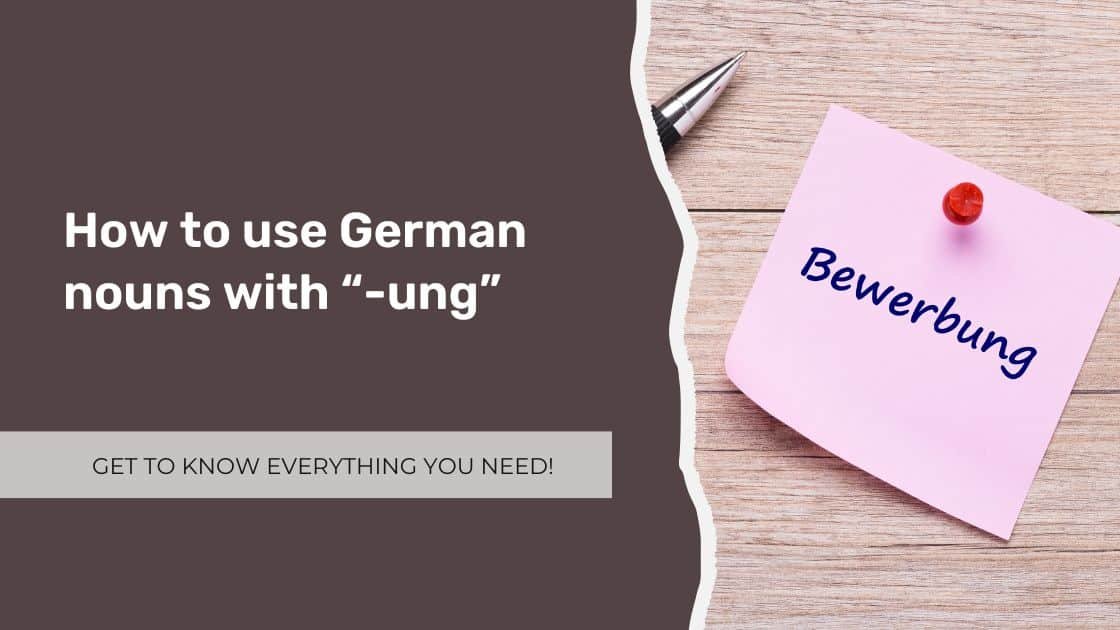Search blog
How to use the adverbs “noch” and “schon”
Many German students confuse the adverbs “noch” and “schon”. In this article, you learn their meaning and how to use them!
How to use German nouns with “-ung”
The three German genders are problematic opponents for many students. Find out in this article how you can use the nouns with “-ung”
What is the difference between “seit” and “für” in German?
Often students get confused with “seit” and “für” in German. Find out their meaning and when you should use which one in this article.
The meaning of “hängen” vs. “hängen” in German
Many have struggled to understand the difference between “hängen” and “hängen” in German. Get to know their differences and how to use them properly.
The difference between “denken” und “nachdenken”
Struggling to understand the difference between "nachdenken" and "denken?" This guide will help you learn the differences between these two verbs.
How to say “nice” in German
When translating the word "nice," students often struggle with getting the right nuances. Get to know all about this German word!
The difference between “werden”, “wurden”, “worden” and “würden”
It is widespread for German students to get confused by the four German verbs “werden”, “wurden”, “worden” and “würden” repeatedly. This article clarifies their meaning and usage.
When to use “als”, “wenn”, and “wann” in German: A Comprehensive Guide
Struggling with when to use 'als', 'wenn', or 'wann' in German? This detailed guide simplifies these tricky conjunctions, ensuring you understand when and how to use them.
When to use “wünschen”, “möchten” and “wollen” in German
Master the subtle differences between "wünschen", "möchten", and "wollen" in German with this insightful guide. Click now to enhance your language skills!
How to show a consequence in German
Discover various German "therefore" alternatives & master their usage! Learn the nuances of each option to show consequences. Click now to excel!
How do adjectives become nouns in German?
Did you know that adjectives can become nouns in German? Continue reading and you will know how to recognize and form them.
When to use capital letters in German
Master capital letters in German with this easy guide! Say goodbye to uncertainty & become a pro at using capitals in German. Click to learn now!
The Ultimate Guide to understanding the German Dative!
Did you start studying German? Now you get lost with Dative and Accusative? After reading this article, you will know when to use each of them!
How to properly react to small talk!
Master German small talk & avoid common mistakes with this guide on expressing how you are. Say it right every time! Click to learn more!
The Ultimate Guide to understanding the German Accusative!
Just started studying German? Struggling with the "Accusative" case? Read this article to become an Accusative pro!
What is the difference between “wollen” and “werden”?
Due to their similarity to English, the two verbs “wollen” and “werden” are easily confused by German students. After reading this article and practicing with its free worksheet, you will be a pro!
The ultimate guide to understanding the German Nominative!
Master the German Nominative case with ease! Learn its meaning and usage in this article and get ready for the next adventure in German grammar. Click here now!
“Blau” – Why Germans are passionate about the color blue…
Mostly the dictionary cannot help with expressions, but after reading this article you know, why Germans have an affinity using the color blue…
Spaß – How to have fun in German
Avoid common mistakes when translating "to have fun" in German! Learn the right way to express fun with this guide. Click now to master German fun phrases!
Weihnachten – How to celebrate Christmas in Germany
Even though Christmas is celebrated in so many countries, it is different everywhere. After reading this article, you will know how Weihnachten is celebrated in Germany!
- Vocabulary
- Passive
- False friends
- Nouns
- Dativ
- Difference
- A2
- Plusquamperfekt
- Adverbs
- Conjunctions
- Questions
- verbs
- Word order
- Abbreviations
- Nominativ
- Relative clauses
- Pronunciation
- Perfekt
- Question words
- B1
- B2
- Genitiv
- Pronouns
- Adjectives
- Akkusativ
- German online course
- German expressions
- Learning methods
- Negation
- Article
- German idoms
- Time
- Formal speech
- Numbers
- Prepositions
- Possessive pronouns
- Comparison
- Seasons
- Separable verbs
- Futur 1
- Interrogative pronouns
- Date
- Irregular Verbs
- Partizip 2
- Werden
- German Grammar
- Umlauts
- Modal verbs
- Verbs
- Auxiliary verbs



















